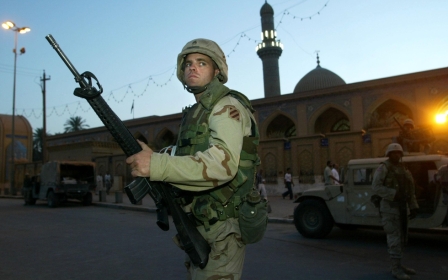Obama to block bill allowing 9/11 families to sue Saudi Arabia

Barack Obama will on Friday veto legislation allowing 9/11 victims to sue Saudi Arabia, risking public outrage and the first congressional override of his presidency.
The White House confirmed on Thursday that Obama will veto the legislation - unanimously passed by Congress - allowing families of those killed in the 2001 attacks to launch civil suits against Riyadh.
"We believe this is a bad bill," said White House spokesman Josh Earnest. "It's why the president's going to veto it."
The White House argues the legislation would undermine sovereign immunity and potentially expose US officials and service members to litigation.
That technical legal argument will struggle to be heard over emotive accusations that Obama is putting relations with Saudi Arabia before 9/11 victims.
Republican nominee Donald Trump has already tried to paint Obama and his would-be successor Hillary Clinton as weak on terrorism.
Clinton has preemptively voiced support for congressional efforts "to secure the ability of 9/11 families and other victims of terror to hold accountable those responsible," according to Jesse Lehrich, a campaign spokesman.
But with the election less than 50 days away, the Republican-led Congress will try to deal Obama a significant political blow by overriding his veto.
Such overrides are rare - this one would show the White House to be almost cripplingly weak as Obama tries to tick off remaining legislative goals in the twilight of his presidency.
Obama has issued 11 vetoes so far in his presidency, none of which have garnered the two-thirds opposition needed for an override.
Republicans seeking to override this veto will need the backing of Democratic lawmakers.
The White House is lobbying Democratic senators furiously in hopes of convincing them to back Obama in blocking the bill.
Congressional sources said on Thursday that White House appeals to security-minded senators like Dianne Feinstein may have been enough to avoid an override vote.
That would be a blow to families of 9/11 victims who have campaigned for the law, convinced that the Saudi government had a hand in the attacks that killed almost 3,000 people.
Fifteen of the 19 hijackers were Saudi citizens.
Declassified documents showed US intelligence had multiple suspicions about links between the Saudi government and the attackers, but no connection has definitively been proven.
"While in the United States, some of the 9/11 hijackers were in contact with, and received support or assistance from, individuals who may be connected to the Saudi government," a finding read.
But a victory for the White House could help ease relations with Saudi Arabia, already strained by Obama's engagement with Iran and the July release of a secret report on Saudi's involvement in the attacks.
A senior Saudi Prince reportedly threatened to pull billions of dollars out of US assets if the bill becomes law, but Saudi officials now distance themselves from that alleged threat.
The White House is getting some backing from diplomatic allies who share concerns about the United States becoming a venue for citizens to sue governments.
In a diplomatic protest note obtained by AFP, the European Union warned the rules would be "in conflict with fundamental principles of international law".
"State immunity is a central pillar of the international legal order," the "demarche" noted, adding that other countries could take "reciprocal action".
In a letter to lawmakers, also seen by AFP, former secretary of defence William Cohen, former CIA boss Michael Morell and Stephen Hadley, George W Bush's national security advisor were among a group of high-profile security figures to warn that the legislation would hurt US interests.
"Our national security interests, our capacity to fight terrorism and our leadership role in the world would be put in serious jeopardy," they said.
New MEE newsletter: Jerusalem Dispatch
Sign up to get the latest insights and analysis on Israel-Palestine, alongside Turkey Unpacked and other MEE newsletters
Middle East Eye delivers independent and unrivalled coverage and analysis of the Middle East, North Africa and beyond. To learn more about republishing this content and the associated fees, please fill out this form. More about MEE can be found here.




